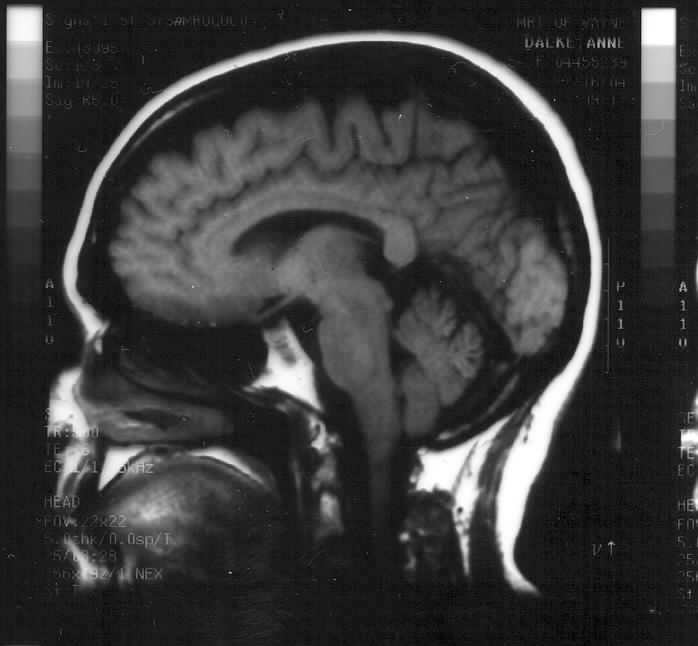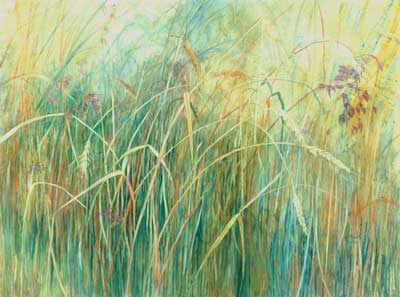Serendip is an independent site partnering with faculty at multiple colleges and universities around the world. Happy exploring!
Notes Towards Day 19: Walt's Experiment, Art's Experiment
I bequeath myself to the dirt to grow from the grass I love,
If you want me again look for me under your bootsoles.
You will hardly know who I am or what I mean,
But I shall be good health to you nevertheless,
And filter and fibre your blood.
Failing to fetch me at first keep encouraged,
Missing me one place search another,
I stop somewhere waiting for you
-----
A central focus of this poem is the relationship between the observer and the observed (between "myself" and the world; between I and you, in loving contact).
We spent a lot of time, in both sections, on this.
A number of you were not interested in the poet's invitation:
Morgan, "Scared": Whitman can go live with someone else, right now I don't need discomfort at my back.
My group thought it felt creepy to be "embraced" by Whitman;
they found "the merge" off-putting. You are in good company.
Whitman was the first to break the mental allegiance. He was the first to smash the old moral conception that the soul of man is something ‘superior’ and ‘above’ the flesh…to seize the soul by the scruff of her neck and plant her…in the body…
Whitman’s essential message was the Open Road. The leaving of the soul free unto herself, the leaving of his fate to her and to the loom of the open road. Which is the bravest doctrine man has ever proposed to himself.
Alas, he didn’t quite carry it out. He couldn’t quite break the old maddening bond of the love-compulsion; he couldn’t quite get out of the rut of the charity habit….sympathy means feeling with, not feeling for…a sinking of Walt Whitman’s soul in the souls of these others…forcing her into other people’s circumstances….
The soul's deepest will is to preserve its own integrity….And my soul takes the open road. She meets the souls that are passing, she goes along with the souls that are going her way….
..the exultance of his message still remains. Purified of MERGING, purified of MYSELF, the exultant message of American democracy, of souls in the Open Road, full of glad recognition…
Several of you have expressed puzzlement about why we are reading this poem, @ this point in the course:
Jackie M: what is the role of someone like Whitman, who writes in such a way that meaning is hard for us to assign? Is this like a stop sign on the road of Evolution?
Lisa B: I struggled this week to fit Leaves of Grass into the evolution theme of this course. Maybe Walt Whitman represented a literary definition of Charles Darwin's theory of natural selection because his poetry was different from his predecessors? Why do we read Whitman instead of another author representative of a literary transitional period?
Tara: I am not really seeing how this fits in with the evolutionary pattern. Is this the breakdown of this novel... where there is constantly a mix between these prose and poetry type passages. Is it meant to represent something bigger? The constant immersion of different stages of evolutionary literary techniques?
Whitman was drawn to (and repeatedly represented) a pre-Darwinian version of evolution. Pp. 61-2 describes the evolution from “the first nothing” to his present fulfilled self, conjuring up the sequence of life forms he may have assumed:
I am an acme of things accomplished, and I am an encloser of things to be....
Afar down I see the huge first Nothing, the vapor...
I know I was even there...I waited unseen and always...
And took my time...and took no hurt from the foetid carbon...
Cycles ferried my cradle...
Before I was born out of my mother generations guided me,
My embryo has never been torpid...
...vast vegetables gave it sustenance...
All forces have been steadily employed to complete....me,
Now I stand on this spot with my soul.
Whitman understood both the "story" of evolution, as Darwin was soon to tell it, and its implications for how we might go about thinking about how we think:
“I like the scientific spirit—the holding off, the being sure but not too sure, the willingness to surrender ideas when the evidence is against them: this is ultimately fine—it always keeps the way open...to try over again after a mistake—after a wrong guess….the readiness to yield, to see what they might have excuses for not seeing. All modern science is saturated with the same spirit, and in this exists its excuse for being.”
“Who learns my lesson complete?
the promise of an incompleteness led
me on…."
Nicholas Kristof's op-ed column on Learning How to Think
(a warning against listening to the "experts"):
draws on a famous
distinction by Isaiah Berlin between hedgehogs and foxes: Hedgehogs tend to have a focused
worldview, an ideological leaning, strong convictions; foxes are more
cautious, more centrist, more likely to adjust their views, more
pragmatic, more prone to self-doubt, more inclined to see complexity
and nuance. And it turns out that while foxes don’t give great
sound-bites, they are far more likely to get things right.
NYTimes Magazine article on
Freedom Dyson, "The Civil Heretic":
Dyson has said he believes that the truths of science are so profoundly concealed that the only thing we can really be sure of is that much of what we expect to happen won’t come to pass. In “Infinite in All Directions,” he writes that nature’s laws “make the universe as interesting as possible.”
Whitman
proposed a poetry that would be the companion of science…the matter of
generations, or roots and seedings, in which primary intuitions of the
universe are at work to realize themselves.
The poet “must indeed recast the old metal, the already achiev’d
material, into and through new moulds, current forms” (“Origins--
Darwinism—Then Furthermore,” Two Rivulets 1876; rpted. in
Notes Left Over, Specimen Days & Collect, 1882).
So: that's one very good answer to Lisa's question about why read "Whitman instead of another author representative of a literary transitional period": because he represented, in poetry, the evolutionary insights of the scientists of his day, and its implications for our day.
But actually more interesting to me than the similarities between Whitman and Darwin's world view (and what I hope you might find more interesting, also :) are the differences between the ways in which they write; these are really what make Whitman a linchpin in this course.
Darwin's book was full up and spilling over with patient research and data gathering.
There is none of that in LofG; Whitman is rarely systematic or consistent.
Do I contradict myself?
Very well then...I contradict myself;
I am large...I contain multitudes.
So the question is: what are we to do with his style?
Of what use might it to us? How does it contribute to evolution?
What contribution does it make to the story of evolution?
"Twenty-eight young men bathe by the shore,
Twenty-eight young men, and all so friendly,
Ah the homeliest of them is beautiful to her.
Where are you off to, lady? for I see you,
You splash in the water there, yet stay stock still in your room.
What can we do with it?
* lunar cycle?
* parable of being locked in ourselves,
desiring the merge, through sensual immersion?

Frog Brain (not to scale!)
|

Anne's Brain (from the inside...)
|
One of the things that emerged, in the course of evolution, was the bipartite brain: a "storyteller" sitting atop a "frog." In Theorizing Interdisciplinarity: Metaphor and Metonymy, Synecdoche and Surprise, Liz McCormack, Paul and I described a difference in story-telling styles that result from the unique "geography" of this brain:
the conscious, deliberate process of categorization, vs.
the less "ruly" associations made by the unconscious
...it may well be that scientists focus on simple and unifying relations that capture key aspects of an object under study...[while] humanists... think in terms of many variables and complicated relations ...
Probably not discipline-specific, but there are certainly two "habits of mind," each one accentuating the work of one part of the mind.
What I want to point out today is the particular "punch" that Walt Whitman's poetry packs in its representation of his/our punning, playful, dream-like, associative unconscious, in which all is simultaneously present (with no sense of linear time, and no sense of argumentation).
Do I contradict myself?
Very well then...I contradict myself;
I am large...I contain multitudes.
in Leaves of Grass, is that Whitman was
representing the "pool of the unconscious":

From the Watercolors of Sharon Burgmayer
Whitman's writing offers the (appearance) of the "swirling" pool of the unconscious: a riotous site, filled with a disordered, dream-like assembly of associations.
This is the irony? paradox? of the evolutionary process that we are tracing for you here. In the course of cultural evolution, from simple to more complex organisms, arose an organism that had the capacity to recapture and reproduce the more primitive, less consciously organized forms of the more primitive portions of the brain, the unconscious.
The sequence (in writing as in art) is from abstract--> complexified-->abstracted. This abstraction may enable new forms to be generated.
Realism to impressionism to abstraction,
and back again, in words...
| |
(from Cezanne's "Quarry" to Popova's "Painterly Architectonic")
"Cezanne is the greatest realist and the greatest abstractionist at the same time." (Marden)
"The power of Cezanne was such that to find myself, I had to go to the limits of abstraction." (Léger)

Fernand Léger, "The Disks in the City"
(or are @ least willing to entertain it as a possibility)
the next question that Whitman raises for us
(@ least for me!) is what role dreams
(or dream-like artistic forms,
like surrealism, or magic realism)
play in this pattern.
Are dream sequences, like the one on p. 28
of LofG, "abstractions" or "elaborations"?
More elaborated than the sensations that might have prompted them, less elaborated than the morning's told version might be?
In either case, what are the use-value of dreams,
like those told in Leaves of Grass?
What is the use-value of the unconscious?
Why do we dream--and record our dreams?
Why might we attend more to them?
schools are fundamentally modernist institutions which privilege rationality/the mind and marginalize the body and its desires.…the function of the school is to separate young people from their sexual subjectivity in the interest of rationality and “brain learning.” This constitutes those in schools (students and teachers alike) as “intrinsically non-sexual”
AD&PG, “Three-Dimensional Storytelling: An Exploration of Teaching Reading, Writing, and Beyond.” Journal of Teaching Writing 23, 1 (2007):
While most of the work we do in college classrooms both originates in and is evaluated in terms of deliberative language use, in which focus and precision are the desired characteristics, much creative work is not carried out in these terms....the academic enterprise generally emphasizes explicit, language-based, descriptive exploration at the cost of implicit, action-based engagement...
a story told by a psychoanalyst, and think about
the limits of this exploration of the unconscious,
the need to put its perception of the world into conversation
with conscious thought. In the interim, we have a few more days to enjoy lolling in the grass w/ Whitman...

How different?)
to the experimentation that is art, more generally?
What does art--this "kind" of art--DO?
What is its use-value for us?
Sontag, "One culture and the new sensibility," continued:
Art...now operates in an environment which cannot be grasped by the
senses...(Buckminster Fuller: "All major advances since World War I
have been in the infra and the ultrasensorial frequencies of the
electromagntic spectrum. All the important technical affairs of men
today are invisible")...
...but of course, art remains permanently tied to the senses....Western
man may be said to have been undergoing a massive sensory
anesthesia...with modern art functioning as a kind of shock therapy for
both confounding and unclosing our senses.
If hedonism means sustaining the old ways in which we
have found pleasure in art... (the pleasure of a melody that one can
hum...of characters...whom one can recognize, of a beautiful
landscape....), then the new art is anti-hedonistic. Having one's
sensorium challenged or stretched hurts.
The commonest complaint about [contemporary films or narratives] is
that they are hard to look at or to read, that they are "boring." But
the charge of boredom is really hypocritical. There is, in a sense, no
such thing as boredom. Boredom is only another name for a certain
species of frustration. And the new languages...are frustrating to the
sensibilities...
But the purpose of art is always, ultimately, to give
pleasure...
affection...for the popular arts..reflects a new, more open
way of looking at the world and at things in the world.


